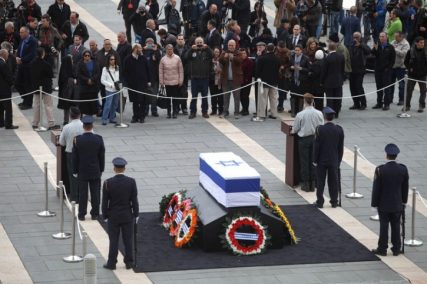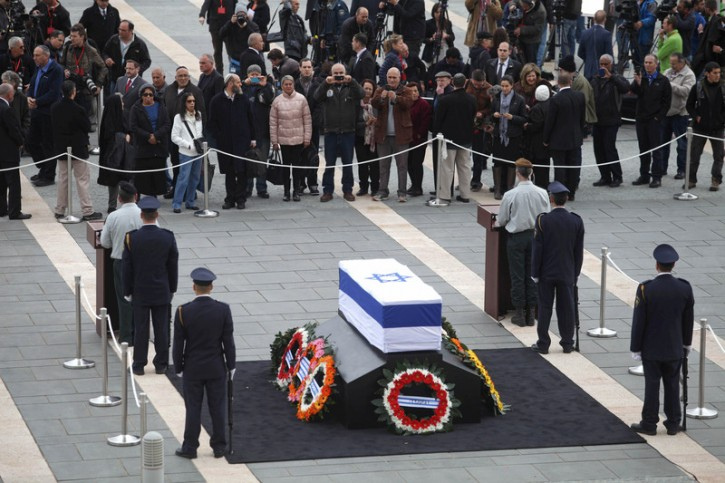Israel held a memorial service today for former Prime Minister Ariel Sharon. The body of Sharon lay in state in a plaza of the Knesset, Israel’s parliament. Reactions to the news of Sharon’s death by Jewish groups in the United States show widespread respect for the former war hero and statesman.

Ariel Sharon’s coffin in a plaza in front of the Knesset January 12, 2014. Photo by Carmen Rodriuez via Flickr http://www.flickr.com/photos/carmenherbs/11922002814/
Sharon was a complex figure in Israeli history: a successful military strategist in the Six-Day War (1967) and the October War (1973), a disgraced leader who failed to stop the killing of innocent Palestinians in the 1982 Lebanon War, a savvy politician, and, as Prime Minister, an advocate for Israeli withdrawal from settlements in the Gaza Strip. He was poised to begin withdrawal from the West Bank when he was struck down by a stroke eight years ago. In mourning his passing, some Jewish groups emphasized Sharon the soldier while others focused on his plan for peace with Palestinians.
The American Israel Public Affairs Committee (AIPAC) spoke for many when it called Sharon “a legendary statesman and soldier, who embodied the indomitable spirit and passion of the Jewish state.” AIPAC said that Sharon was being remembered as both a warrior and someone dedicated to peace for Israel.
Robert G. Sugarman and Malcolm Hoenlein of The Conference of Presidents of Major American Jewish Organizations said that Sharon did more than serve his country. He also reached out to the diaspora around the world.
“Prime Minister Sharon in all of his positions never missed an opportunity to meet with the Conference and address us, and often took us on tours to understand better the defense and security needs and the strategic issues confronting Israel,” said Sugarman and Hoenlein. “Prime Minister Sharon always went out of his way to discuss and take into consideration the views of the diaspora community and valued his role not only as Prime Minister of Israel but also as a leader of the Jewish people.”
American Jewish Committee executive director David Harris called Sharon “a man of towering strength, uncompromising commitment, steely determination, and creative vision.”
Harris said Sharon’s withdrawal from the Gaza Strip and support for the two-state solution showed Sharon’s pragmatism. The two-state solution failed, said Harris, “because of the Palestinian failure to seize Israel’s outstretched hand. “
J Street, in its statement on Sharon, said the two-state solution failed because it was not implemented right.
“One lesson from the Gaza withdrawal is that Israel’s conflict with the Palestinians can only really be solved by the sides negotiating a peace agreement that ends the Israeli occupation, establishes a Palestinian state and settles all outstanding issues and claims,” J Street said in a statement. “Still, Sharon deserves credit for the intellectual journey he took during his life and for having the courage to lead.”
J Street’s statement also said that the organization honors Sharon, who J Street described as “a soldier and statesman who left an indelible mark on Israel and the Middle East.”
Union for Reform Judaism president Rabbi Rick Jacobs called Sharon an “iconic leader” and a “visonary” who loved both Israel and the Jewish people. Jacobs did not present a unvarnished picture of Sharon. Jacobs listed off both Sharon’s accomplishments and his limitations, including his role in the deaths of refugees in 1982. Still, Jacobs said Sharon was an inspiration.
“Though his absence has been felt since he suffered a stroke in 2006, his own words and legacy continue to inspire: ‘The future lies before us. We are required to take difficult and controversial steps, but we must not miss the opportunity to try to achieve what we have wished for, for so many years: security, tranquility and peace.’,” said Jacobs.
Americans for Peace Now president Debra DeLee said that she hoped that Sharon Israel’s leaders would learn from Sharon and push for peace.
“Israelis today are saying farewell to a bold leader who toward the end of his political career was transformed from a staunch hawk who initiated war and provocative belligerent actions to a leader who recognized that Israel’s strategic interests lie in an agreement with the Palestinians,” said DeLee.
Many saw Sharon’s ability to change his thinking on settlements and the two-state solution as his most remarkable attribute.
“Israel lost a unique and unusual leader who demonstrated the ability to change his way of thinking and seeking out new paths,” B’nai B’rith International president Allan J. Jacobs said. “He was a brave and fearless soldier, a wise and brilliant leader, who left a lasting impact on Israel.”
The Anti-Defamation League (ADL) also noted that Sharon’s passing was a loss for the Jewish people worldwide. ADL’s Barry Curtiss-Lusher and Abraham Foxman said, “[Sharon’s] legacy is a more secure State of Israel, safe on its borders and resolved to put an end to the campaign of Palestinian terrorism once and for all. It is not only Israel, but the Jewish people, the U.S., and the international community who have lost a towering figure who offered hope to his people and the region.”
Hadassah, a women’s zionist organization, described Sharon’s devotion to Israel as “fierce and legendary.” What Hadassah did not say in its statement, however, was anything about Sharon’s final chapter pushing for a withdrawal from the settlements or his role in the refugee deaths in 1982. Instead, there was only a list of his military accomplishments and role in the founding of Israel.
“Hadassah is saddened by the loss of a true Zionist and protector of Israel,” said the group.
Of the many statements on Sharon’s life a blog post by Rabbi Stanley Davids for Association of Reform Zionists of America (ARZA) is one of the most detailed and personal. Like many others, there were times Davids despised Sharon and times that he praised him. In the end, however, he mourned the loss of a man who is best described as “complex.”
“We mourn the passing of a complex, powerful leader, a man who continued to grow and evolve throughout his life, a patriot and a peacemaker, a man whose greatness was marred by grievous errors and misjudgments, by charges of malfeasance and breach of faith, a man who never put down the gun even as he gently held fast to the dove of peace,” said Davids. “Ariel Sharon challenges all of us now to look to what is best for Israel as a Jewish democratic state – and to have the courage to pursue that vision. In the face of party platforms, petty political bickering, a thousand good reasons to blame everyone else for our problems and the security of the status quo – Sharon’s vision then and now challenges us all.”





